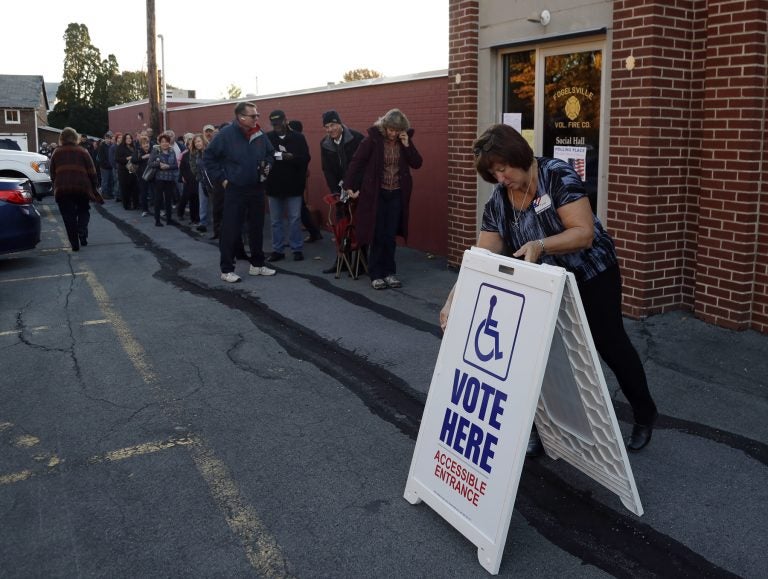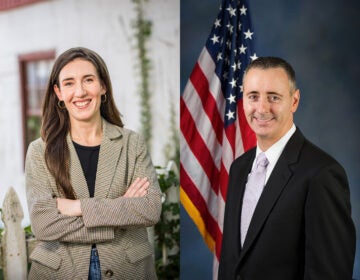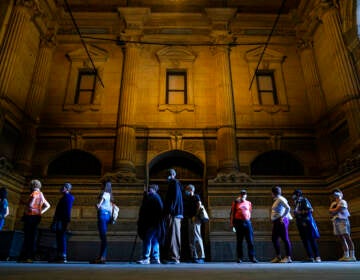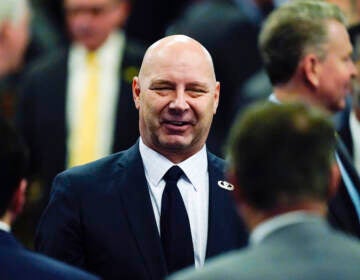Third of Pa. delegation decamping U.S. House, leaving six seats up for grabs
Pennsylvania will have at least six open congressional seats in the upcoming midterm election as one incumbent after another has decided not to run again.

An election official places a sign as voters line up outside a polling place November 2016 in Fogelsville, Pa. (AP Photo/Matt Slocum)
After Philadelphia U.S. Rep. Bob Brady’s surprise announcement last week that he will not seek re-election, Pennsylvania now has six open congressional seats for the midterm election. Those vacancies are due to incumbents retiring, a run for U.S. Senate, and scandal.
Stephen Medvic, professor of government at Franklin & Marshall College, said he can’t remember the last time Pennsylvania had this many seats up for grabs in a single election cycle.
Although midterm elections are typically tough for the party that holds the presidency, Medvic says it’s rare to have a third of Pennsylvania’s delegation out of the running.
The GOP currently holds a majority of those seats.
“This is kind of a perfect storm, a bad year for one party, frustration with the way the process is working, and then kind of an unusual amount of scandal going on,” said Medvic. “All those things just sort of add up to a larger than usual number of people retiring.”
Medvic also points to growing frustration over Washington partisanship as another factor for all the vacant seats.
Longtime Lehigh Valley Congressman Charlie Dent, a Republican representing the 15th District, said increased polarization was one of the reasons he decided not to run for re-election.
In addition to Democrat Brady and Dent, U.S. Rep. Bill Shuster, who represents the 9th District, a Republican stronghold in the southwestern part of the state, said earlier this year he’s retiring.
Congressman Lou Barletta, a Republican in the 11th District, has decided to challenge U.S. Sen. Bob Casey, a Democrat.
After reports that Delaware County U.S. Rep. Pat Meehan used taxpayer money to settle a misconduct complaint to a former aide he referred to as a “soul mate”, Meehan announced last month that he would not run for re-election in the 7th District.
Former Congressman Tim Murphy, from the 18th District, resigned in October after allegations that the conservative lawmaker encouraged a woman with whom he had an extramarital affair to terminate a pregnancy.
A special election to complete the rest of Murphy’s term is set for March 13.
Shifting political landscape
Meanwhile as one incumbent after another has decided not to run again, the Pennsylvania Supreme Court overturned the state’s congressional district map as an unconstitutional partisan gerrymander.
The court ordered the state Legislature to draw a new map, and the ruling has caused chaos and uncertainty for candidates in the upcoming election.
With a new map in place before the midterm election, congressional districts could change dramatically.
Bruce Ledewitz, a law professor at Duquesne University, said incumbency is a big advantage when it comes to congressional elections and having an unusually high number of vacant seats will affect how district lines are redrawn.
“If it’s an open seat, you have a little more leeway,” said Ledewitz. “You could make a Republican district a little more Democratic and make it a closer race and still keep it a Republican seat.”
The state Legislature has until Friday to present Gov. Tom Wolf with a new map. If lawmakers and Wolf cannot agree on a new map by Feb. 15, the Pennsylvania Supreme Court said it would create one itself.
WHYY is your source for fact-based, in-depth journalism and information. As a nonprofit organization, we rely on financial support from readers like you. Please give today.






